Books generated by Imagining the Internet projects

The ‘Future of the Internet’ series
The series of books based on Pew Research and Elon University expert surveys garners smart, detailed assessments of multilayered issues from a variety of voices, ranging from the scientists and engineers who created the first Internet architecture a decade ago to social commentators to technology leaders in corporations, media, government and higher education. Technology builders, entrepreneurs, consultants, academicians and futurists from around the world share their wisdom.
The series of surveys garners smart, detailed assessments of multi-layered issues from a variety of voices, ranging from the scientists and engineers who created the first Internet architecture a decade ago to social commentators to technology leaders in corporations, media, government and higher education. Among the respondents are people affiliated with many of the world’s top organizations, including IBM, AOL, Microsoft, Intel, ICANN, Apple, the Internet Society, Google, W3C, Internet2 and Oracle; Harvard, MIT, Stanford and Yale; and the Federal Communications Commission, FBI, US Census Bureau, Social Security Administration and US Department of State.
They provide significant and telling responses to questions about the future of government, education, media, entertainment, commerce and more. They foresee continuing conflicts over control of networked communications and the content produced and shared online. They also predict major changes ahead for everyone in every field of endeavor.
The extensive elaborations supplied by Future of the Internet survey respondents provide a vision of a networked, digital future that enhances many people’s lives but also has some distressing, even dangerous implications.
You can order the books, including e-book versions, directly from the publisher, Cambria Press, online or from online retailers such as Amazon and Barnes & Noble. Brief details about each book follow.
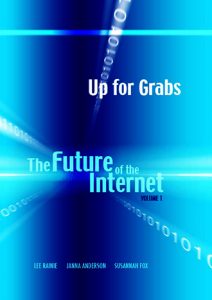 Up for Grabs:
Up for Grabs:
The Future of the Internet I
In brief: “Up for Grabs” (Cambria Press) is a print volume – the first in a series – that includes most of the data generated for the first “Future of the Internet” survey conducted by Elon University and the Pew Internet & American Life Project in 2004.
How will the Internet be expected to change the workplace, family life, education and many other foundations of society between 2004 and 2014? Profoundly. That was the forecast of nearly 1,300 leading technology experts and scholars who responded to The Future of the Internet I.
The extensive elaborations supplied by survey respondents provide a vision of a networked, digital future that enhances many peoples’ lives but also has some distressing implications.
The big-picture Internet issues by 2020, as foreseen by the experts in this 2004 survey, include:
- Positive and negative changes in the family dynamic, in the workplace, in government, in schools
- A conflict between our desires for privacy and for security
- Values-balance tensions between intellectual property rights and our desire for the convenience of free information-sharing on networked devices
- A concern over being inundated with information
Chapters cover the future of institutions, social networks, the Internet infrastructure, digital products, civic engagement, embedded networks, formal education, democratic processes, families, extreme communities, politics, health systems, personal entertainment, creativity and connections through the Internet.
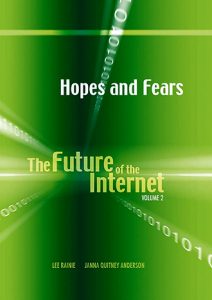 Hopes and Fears:
Hopes and Fears:
The Future of the Internet II
The second book in the series contains data gathered in the 2006 Future of the Internet II survey. Participants in the study reacted to questions that asked them to frame seven 2020 networked information technology scenarios related to national boundaries, human languages, artificial intelligence and other topics.
Among the questions implicit in the scenarios were:
Will there be a global network that reaches more people? The majority said a global, low-cost network – due thanks in great part to the mobile broadband revolution – will thrive by 2020.
Will more people choose to live “off the grid”? Some answered that they expect luddites to commit acts of terror and they expect more violent pushback against technological evolution.
Will autonomous machines leave people out of the loop? Many people predicted that autonomous technology will raise new problems.
Will English be the lingua franca? Most said English will continue to be the dominant global language, with a few predicting Mandarin will make great strides.
Will national boundaries be displaced by new groupings? Many said the Internet will allow people to form new social, economic and political groups that ignore traditional “national” boundaries by 2020.
Among the themes in the predictions: Continued serious erosion of individual privacy; the improvement of virtual reality and rising problems tied to it; greater economic opportunities in developing nations; changes in languages, as they evolve and global voices unite; the rise of autonomous machines that operate beyond human control.
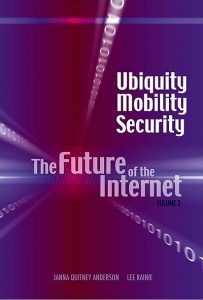 Ubiquity, Mobility, Security:
Ubiquity, Mobility, Security:
The Future of the Internet III
This book delves into people’s expectations tied to future mobile devices, Internet interfaces, work and life changes and the architecture of the Internet.
Some 578 leading Internet activists, builders and commentators responded in the 2008 Elon-Pew survey to scenarios about the likely effects of the Internet on social, political and economic life in the year 2020. An additional 618 stakeholders – Internet users who opted in to an open invitation from Pew Internet and Elon – also took part in the study, for a total of 1,196 participants who shared their views.
The book includes expert respondents’ insights on:
- The role and importance of mobile devices
- The transparency of people and organizations
- Talk and touch user interfaces with the Internet
- The challenges of sharing content while trying to perfect intellectual property law and copyright protection
- Divisions between work and personal time given the blurring of physical and virtual reality
- The “next-generation” engineering of the network to improve the current Internet structure.
Among the respondents are people affiliated with many of the world’s top organizations, including IBM, AOL, Microsoft, Intel, ICANN, the Internet Society, Google, W3C, Internet2 and Oracle; Harvard, MIT and Yale; and the FCC, FBI, US Census Bureau and US Department of State.
They provide significant and telling responses to questions about the future of government, education, media, entertainment, commerce and more. They foresee continuing conflicts over control of networked communications and the content produced and shared online.
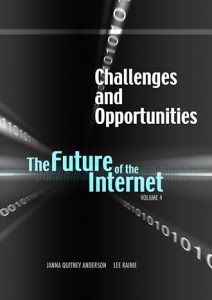 Challenges and Opportunities:
Challenges and Opportunities:
The Future of the Internet IV
This book includes content gathered from the 2010 Elon University-Pew Internet survey. Topics include the end-to-end principle, the semantic web, the future of reading and writing and perceptions of the ways in which knowledge acquisition is changing.
It shares experts answers to such questions as, “Is Google making us stupid – what is the future of intelligence in the age of instant information?”
This and other important issues were addressed by nearly 900 expert respondents who wrote compelling answers to the 10 questions asked in the Future of the Internet IV survey.
Technologists, business leaders, scholars and others shared their views about the Internet and the evolution of:
- Intelligence
- Reading, writing and the rendering of knowledge
- Identity and authentication
- Gadgets, applications and the predictability of innovation
- Personal and social relationships
- Industrial-age institutions
- Cloud computing
- The Semantic Web and Linked Data
- Generation Y, also known as the Millennials
- The core values of the Internet, such as the end-to-end principle.
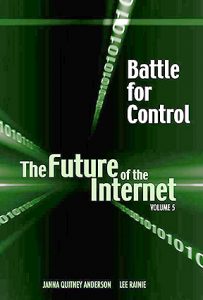 Battle for Control:
Battle for Control:
The Future of the Internet
At 548 pages, this book is a comprehensive compilation of results from eight major research reports released in the first half 2012 by the Pew Research Center and Elon University. Respondents to this survey shared insights driven by a series of eight potential 2020 scenarios posed to them in late 2011.
In The Future of the Internet Survey V, more than 1,000 experts shared their views as they imagined the future of the Internet and:
- The always-on, hyperconnected generation who will be in their teens-to-20s by 2020
- The evolution of the mobile Web, HTML5 and native apps
- E-money, “mobile wallets” and financial transactions through near-field communication
- Gamification – the influence of game mechanics implemented for interactivity and engagement
- “Smart systems” and the evolution of more efficient homes
- Corporate responsibility in the digital age
- The influence of “Big Data” in the cloud
- The future of higher education
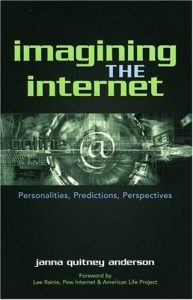 Imagining the Internet:
Imagining the Internet:
Personalities, Predictions, Perspectives
The first book produced out of the work of the Imagining the Internet Center is a witty look at the smart statements stakeholders and skeptics were making from 1990 to 1995 about the future of the Internet. “Imagining the Internet” (Rowman & Littlefield), is a print book that serves as a companion to the “Early 1990s Predictions Database.”
It shares concepts of such thinkers as Ithiel de Sola Pool, Vannevar Bush, Duncan Watts, Albert-Laszlo Barabasi and Isaac Asimov while parsing the thoughts of Bill Gates, Nicholas Negroponte, John Perry Barlow, Bruce Sterling, Clifford Stoll, Al Gore and dozens of other networked communications stakeholders and skeptics.
This book was selected by the American Library Association as a “Choice” book for 2006 – named an outstanding academic title – in the top 10 percent of works published.
Click here to read excerpts from each chapter
In addition to offering a large collection of quotable forecasts from tech luminaries of the 1990s, it includes a brief communications history lesson and a deep look at what experts have predicted to be the likely future of pervasive networks of all kinds, incorporating the stories of Six Degrees, the Romantics, the Utopians, technorealists, gaia and a projected battle between Cosmists and Terrans over a future in which artilects may dominate the galaxy.

